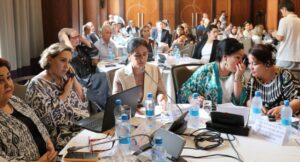
UN Women Tajikistan Raises Awareness on Gender-Based Violence through Roundtable on GBV Project Conclusions
- Gender
- No Comment
- 216

The Roundtable on “Addressing and Responding to Gender-Based Violence (GBV): Successes, Challenges, and Coordination Efforts” took place on 31 July in Dushanbe, Tajikistan. The roundtable convened 70 participants from a variety of organizations. Attendees includes representatives from governments, international organizations, public institutions, gender equality experts, women’s rights activists, journalists, and media professionals. This event was coordinated by UN Women Tajikistan with the cooperation of Committee on Women and Family Affairs under the Government of the Republic of Tajikistan in partnership with US Embassy in Tajikistan, Embassy of France in Tajikistan, UN RC, NGO “Gender and Development”.
One in three women worldwide experience physical or sexual violence, mostly by an intimate partner. Violence against women and girls is a human rights violation with immediate and long-term physical, sexual, and mental consequences that can be devastating. It negatively impacts women’s general well-being and hinders their full participation in society, affecting their families, communities, and the country at large. The costs are tremendous, ranging from increased healthcare strains to legal expenses and productivity losses. In Tajikistan, according to the Bureau for Human Rights and Rule of Law, between 50% and 80% of women and children are subjected to violence. The UN estimates that a third of women in Tajikistan are abused by their husbands and close relatives, but few seek help. Although the DHC report of 2023 shows a decrease in violence against women—indicating that the prevalence of spousal physical, sexual, or emotional violence decreased from 31% in 2017 to 16% in 2023—much more needs to be done.
The Roundtable on “Addressing and Responding to Gender-Based Violence (GBV): Successes, Challenges, and Coordination Efforts” aimed to foster dialogue and collaboration among key stakeholders, highlighting successful strategies, identifying persistent challenges, and enhancing coordination efforts to effectively address and respond to GBV. The roundtable served as a pivotal platform for exchanging insights on both successes and challenges encountered while implementing state policies to prevent domestic violence. It provided a valuable opportunity to evaluate the collaborative efforts between government and non-governmental organizations in combatting violence throughout 2023-2024.
During the roundtable, participants exchanged views and experiences on the policies and strategies by the Committee on Women and Family Affairs (CoWFA) aimed at promoting gender equality and enhancing public awareness. They concurred with the Deputy Chairman’s statement that the extensive social activities and efforts undertaken by the Government of Tajikistan will undoubtedly contribute to the reduction of gender-based violence. However, participants also emphasized that further actions are necessary, such as the criminalization of domestic violence, following Kazakhstan’s example.
About the project
The “Gender-Based Violence (GBV) Prevention and Response in Tajikistan” project has made significant strides in protecting women’s rights and addressing domestic and gender-based violence. The initiative has focused on strengthening capacities and integrating service provisions, including those offered by CSOs/WROs and shelters, across Shahritus (Khatlon), Istaravshan (Sogd), Varzob (DRS), and Dushanbe. Key achievements include hiring a lawyer to support GBV survivors, benefiting 79 women from June to December 2023, and equipping shelters with essential items. A study visit to Georgia in June 2023 allowed key stakeholders to learn best practices, while orientation training for the NGO “Gender and Development” helped streamline project implementation and coordination. Additionally, laptops and printers were provided to CSOs and women’s departments, an EVAW database was installed, and a hackathon was organized to develop a mobile app/game to raise youth awareness on VAW/GBV. Furthermore, exchange visits and study trips, including one planned for Florida in May 2024, were arranged to foster knowledge sharing and collaboration on shelter management.
Key highlights
An initial assessment was conducted to gauge the population’s knowledge about GBV, the issues surrounding it, and the awareness of existing services and referral mechanisms. This assessment included 15 focus group discussions (FGDs): 6 with men, 6 with women, and 3 with representatives from the government, CSOs, and media, involving a total of 120 participants (48 women, 48 men, and 24 from the government, CSOs, and media). During the “16 Days of Activism against Gender-Based Violence,” various outreach activities were carried out, including the posting of a video on social media, airing two radio programs on the Sadoi Dushanbe channel, and publishing two articles in the newspapers “Farazh” and “Asia Plus.” Additionally, one article was shared on social networks. The video can be viewed here.
The mobile application “Be Zurovari,” developed as part of the project, aims to support women who have faced gender-based violence, has been presented during the roundtable. Although the app is still being finalized, links were shared with participants during the roundtable for testing and feedback. The app features three main options: a call button for immediate contact with the nearest shelters, police stations, or relevant government entities; comprehensive information on the legal aspects of gender-based violence, including links to administrative and criminal laws; and a map detailing related entities and services.
At the Forum, partners emphasized the need for gender-sensitive solutions and gender-responsive financing to drive transformative changes benefiting everyone. The event highlighted positive international experiences, including insights from expert Aitbek Amelgeldy from Kazakhstan. He discussed a notable case of domestic violence that led to legislative reforms in Kazakhstan and stricter penalties for offenders.
The roundtable concluded with a call for a comprehensive review of progress on gender-based violence in Tajikistan. Participants also advocated for stronger efforts to address gender-based violence in the country, agreeing on the need to criminalize domestic violence, following Kazakhstan’s example. Additionally, the second phase of the GBV Project was announced, set to begin operations this September. The main aim of the new project is to provide legal advice and raise awareness among judges on gender equality and women’s support in cases of family disputes.
For more information, please contact: Davroni Davronzoda, National Communications Consultant, UN Women Tajikistan, e-mail: davroni.davronzoda@unwomen.org.
https://eca.unwomen.org/en/stories/news/2024/08/un-women-tajikistan-raises-awareness-on-gender-based-violence-through-roundtable-on-gbv-project-conclusions





